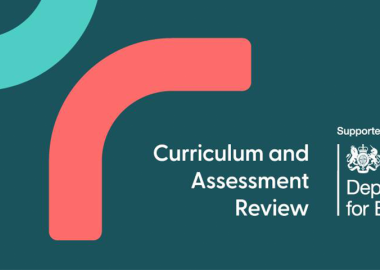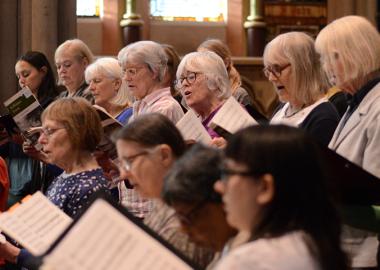Many of us involved in music making in our spare time never think about why it matters. We enjoy it, so we assume everyone understands its importance, and often don’t appreciate that it might be helpful to engage with the larger community who do not automatically share our enthusiasm. So why should you consider telling the world about making music?
Making music has real, measurable, tangible positive effects on individuals, on their community and on the local economy. If we do not tell the world about these effects, they will be taken less seriously than they should or even be ignored. This could mean that those who fund us and who make the policies which facilitate or hinder our music making do not take us into account in their decision making, with potentially far-reaching consequences (think venues and music libraries, for instance).
The economy is making life difficult for leisure-time and community music groups as much as for everyone else – costs are rising, whether for venues or professional artists, audiences are less able to afford attending our concerts, for which we are having to charge more, and there is less and less external funding to support our projects.
We are all grounded in our local communities from which we draw our players and singers and to whom we perform. So it is especially important that we communicate the value and importance of music making to our local authorities.
They themselves of course have suffered particularly in these last few years and are cutting their budgets more and more. In many cases they no longer fund arts activities and simply do not consider the arts, including music, within their “mainstream” policies. Yet there are very good reasons why they should do so, and we can help them see those reasons if we have a clear sense of why our music making is important and how we can express – and prove! – that.
For instance, local authorities are now responsible for public health where prevention and community wellbeing are high on the agenda – issues that taking part in music making can have a positive effect on. There is also the economic impact of music and the wider arts – bringing in more visitors and tourists, and contributing strongly to regeneration.
So whilst we may think of local authorities as threats at the moment, in fact they are also our best and biggest opportunity for support (not always in money of course!). But to turn them into fans of music making, we need to have the arguments at our fingertips, preferably supported by solid facts, as well as individual testimonies, and we need to speak in their language.
This guide sets out why leisure-time and community music making matters, and provides information to argue the case for it – not just to local authorities, but to funders, potential members, audiences, and music education hubs, just to give a few examples.
There is a summary if you only want the headlines and soundbites, for instance to use in press releases, or on your website and social media. There is also a more in depth look at the argument for those who would like to understand it in more detail or for use in longer documents, for example as part of funding applications.
The information is based on the most recently available data from members (principally the Making Music Treasurers’ Survey of 2013) and a wide range of publicly available reports, and will be updated from time to time.
SummaryThe benefits of leisure-time or community engagement with music are multi-layered.
|
More detailed development
Making music together has always been an important part of our cultural lives. As we face a future that will be characterised by pressures on living standards, a widening gap between the rich and the poor, and unaffordable health and social welfare systems, we will need, more than ever, new initiatives that both reduce costs and help to improve social cohesion. Participative music making is singularly well equipped to make an important contribution, and we all need to ensure that decision-makers recognise the opportunity that we offer rather than undervalue our contribution and discount it as essentially the preserve of a privileged few.
- www.artscouncil.org.uk/sites/default/files/download-file/The_value_of_arts_and_culture_to_people_and_society_an_evidence_review.pdf
- A report specifically on Scotland: http://www.creativescotland.com/what-we-do/creativity-matters
With reference to points 1 & 3: A provider of improved health and wellbeing for participants
Anyone involved in making music knows intuitively that it is good for them. In recent years those benefits have been the subject of academic research – and the results have not only confirmed what we always knew but have provided insights into how and why music is important. We now know that active involvement in music, especially group activity, releases chemicals in the brain that reduce stress and increase feelings of wellbeing, and there is even emerging evidence that it improves empathy so that people can and do work better together. One large scale international study has shown that choir members report statistically significant better health and wellbeing than comparative groups not in choirs.
As with all such research, the question is often raised whether people are happier and healthier because they are in a choir or whether they have chosen a choir because they are already happier and healthier. The Sidney De Haan Research Centre in Folkestone is a world leading centre in this field and they have undertaken a randomised control trial involving structured group singing for older people. Their research shows that the individuals in the control group and those in the singing groups were broadly similar on recognised measures of wellbeing and similar scales but after 3 months of weekly singing, the singing groups showed statistically significant improvements both in generalised mental health and a reduction in depression. So the scientists are proving what we know, and more importantly providing an evidence base that group participatory music has much to offer a wide range of disadvantaged people. (See other studies on the Sydney de Haan Research Centre for Arts and Health website)
In addition many members use music to support underprivileged groups – older people in particular have benefited from the work of volunteer members who have made a difference to their lives and helped reduce the social isolation that can be a crushing burden. Member groups also perform their music in healthcare settings (e.g. hospitals), care homes, prisons and other locations to benefit lonely, isolated, deprived or difficult to reach people.
With reference to points 2 & 3: A potential provider of improved health and wellbeing for the wider community
The general evidence of the benefits of music has resulted in a wide range of initiatives to demonstrate how participation in group music making can help individuals and communities. There is a continuum of music based interventions which at the moment is primarily focused on singing as this is not only something that everyone can do, but is also a lower cost approach. The interventions range from community choirs simply bringing people together and singing; through wellbeing choirs which are focused on individuals with issues of social isolation, stress, depression; to choirs for older people; to a range of interventions supporting users of mental health services, those suffering from Chronic Obstructive Pulmonary Disease (COPD), dementia, Parkinson’s and stroke victims. A wide range of initiatives, all of which are showing promising results.
Some articles on specific health benefits of music:
- http://www.ageuk.org.uk/health-wellbeing/conditions-illnesses/dementia-a...
- http://www.alzheimers.net/2014-07-21/why-music-boosts-brain-activity-in-...
- http://cdn.buildresources.co.uk/sites/802/docs/LMN-Music-as-Medicine.pdf
These developments come at a particularly critical time, as the National Health Service faces enormous challenges with rising incidence of age related conditions, increase in issues of mental wellbeing and a realisation that many aspects of health are driven by social exclusion. In addition government policy seeks to increase the focus on public health and prevention of poor health which includes wellbeing by increasing monies allocated to public health and allocating responsibility for it to local authorities. The NHS and local authorities will be looking for cost effective innovative ways of helping to make individuals and communities happier and healthier, and music has a role to play.
There is also evidence of the community impact of arts activity, e.g. see this Scottish study.
With reference to point 4: An economic contributor
As an individual group, it is all too easy to underestimate the cumulative economic importance of voluntary music. It is only when figures are aggregated that the economic impact becomes clearer – and it is worth recognising that the figures for Making Music members probably represent only around a quarter of the total national impact (according to the 2008 DCMS study referenced above which suggests there are around 13,000 leisure-time music groups in total in the UK).
Based on Making Music’s Treasurers’ Survey of 2013 data, the turnover of all leisure-time music groups UK-wide is estimated at £100m. £18.7m was spent on professional artists, including musical directors, rehearsal accompanists, orchestral fees and soloists. £1.8m a year was paid out to music publishers; and with 12,000 concerts and their associated rehearsals substantial sums were paid out in venue hire. Local businesses benefit from printing activities and advertising, and in addition there are substantial indirect economic benefits as audiences incur transport and refreshment costs that also boost the local economy.
While the contribution of any one member group may not appear significant, the effect is like that of any Small and Medium Enterprise: cumulatively they matter a great deal, and together make an important difference - and you do that with negligible contribution from the public purse. It is quite wrong for planners, analysts and funders to ignore this significant cumulative input.
- www.ukmusic.org/research/measuring-music-2018/
- www.artscouncil.org.uk/exploring-value-arts-and-culture/arts-culture-and-economy
With reference to point 5: A major player in and supporter of the voluntary sector
Local authority plans all too often focus on tangible assets, and in the current economic climate that financial focus has been reinforced. The reality however is that communities are not simply defined by buildings and other infrastructure. What creates, defines and sustains a community is often what is referred to as social capital – and a network of voluntary organisations is a critical part of any community’s social capital. Voluntary music is an important way to help create a sense of community, and the rapid growth of community choirs is evidence of that. Our members however not only provide a socially inclusive activity that can help create a sense of identity, they also help other voluntary groups in very specific ways. It is an amazing and heart-warming fact that in spite of all the difficulties facing Making Music members, they fundraised and donated £1.8m to charity in 2010 – almost £650 per member group – over 4% of their gross income.
With reference to points 6 & 7: A source of enjoyment
In 2010-2013 our 3,000 members staged around 12,000 concerts a year to audiences of around 1.5 million people annually. They did this throughout the UK, bringing live music to communities that without voluntary music would often have had none. Almost as important as the sheer volume of performances is their diversity, both within and between genres. Making Music members are performing diverse and exciting repertoires that challenge and entertain their audiences. The performances encompass brass bands, choirs - (chamber, community, gospel and large choral groups), hand bell ringers, jazz bands, orchestras, opera as well as presenting of professional concerts involving individual instrumentalists and ensembles. Musical activities were not limited to conventional performances however, for you also ran 7,000 open rehearsals, and 2,500 educational events and workshops. So voluntary music is an important source of enjoyment, often to people who cannot or choose not to access live music any other way – and that provision of enjoyment is backed up by substantial educational activity.
With reference to points 8 & 9: A guardian of tradition and its development and its development
The United Kingdom has an almost unrivalled tradition of brass bands, choral music, and classical orchestras. These traditions are heavily represented in voluntary music, and without that base would be seriously weakened. Many members’ concerts focus on traditional works, but importantly two thirds of all concerts have included works written since 1938 (i.e. still in copyright), and half of all concerts featured works by living composers (data from Making Music’s Treasurers’ Survey of 2013). In addition, nearly a third of member groups commissioned a new work between 2010 and 2013. Leisure-time and community music groups are maintaining important cultural traditions, but not in reactive ways – through the commissioning of new works, through the diversity of repertoire, through opening up to other European traditions, and through genre diversity, groups are allowing our traditions to evolve and remain vital.
Whilst Making Music members are overwhelmingly small, their sheer number (an estimated 12,000 throughout the UK) makes them significant players in terms of royalty revenues for composers and arrangers. The composer was undoubtedly paid for the original composition for a professional or leisure-time group, but it is from the ongoing performances of such new works up and down the country by hundreds of leisure-time groups that he or she, and their publisher, will derive an ongoing income, and it is his or her popularity with Making Music member groups which will allow a composer to have a career and earn a living from writing new music, and encourage a publisher to keep investing resources into nurturing new composers.
And that’s not all: large scale works, even if performed by professional ensembles, usually employ the services of one or several leisure-time choirs (e.g. Carmina Burana), or indeed are done very rarely by professional ensembles, and are kept alive – for audiences and performers alike – by leisure-time performers. This means these works continue to generate revenue for the professional music sector through score hire/sales, CD/streaming sales, concert tickets etc. because the leisure-time sector has regularly performed them all over the UK. Whilst particularly true of choral works, this also applies to large scale or unusual orchestral works, e.g. Richard Strauss’ Alpine Symphony.
Leisure-time music groups should therefore never feel in any way inferior or less important to professional ensembles – without leisure-time musicians providing the ongoing performances, in any and every place of the UK, over many years, many composers and publishers would be significantly worse off, indeed many composers’ careers would quite possibly not be viable.
With reference to point 10: The foundation of our music ecology
The Department of Culture, Media and Sport in their report Our Creative Talent (2008) calculated that there are around 12,000 voluntary music groups in England alone with over 1.6 million total participants. The study estimates that leisure-time arts activity could amount to around 20% of total arts activity.
The importance however is not limited to the volume of activity. What is perhaps of equal importance is that our members provide career opportunities for emerging musicians – whether they be performers or soloists –; opportunities that would not exist without them.
The DCMS study calculates that around 34% of voluntary arts groups see members progress to become professionals. This is also referenced in Ruth Finnegan’s 1989 in-depth study of leisure-time music making in Milton Keynes, The Hidden Musicians.
More significantly, in the three years leading up to Making Music’s Treasurers’ Survey of 2013, Making Music members engaged over 34,000 professional artists every year to a total value of £18.7 million, and commissioned around 400 new works every year, spending also around £1.7 million annually with music publishers. The professionals employed by Making Music members are accompanists, conductors, soloists (voice or instrument), arrangers and composers.
It should also be remembered that leisure-time musicians employ a significant number of music teachers privately to pursue their leisure activity. ABRSM’s Making Music report (2015): 5% of all adults, or 2.5 million, currently have music lessons. That is a significant amount of income for many music teachers.
In addition, through our Adopt a Composer scheme and Awards for Young Concert Artists participating members actively contribute to the careers of some of our most talented emerging professional performers and composers.
Without voluntary music the live music industry would shrink and career paths would be destroyed, and this is freely recognised by many leading professional performers and composers who not only acknowledge the importance of the voluntary sector but reinforce that by becoming patrons of those groups that helped start their careers.
Summary
What you do matters, not only to your members but to a much wider group. The leisure-time and community music sector is a foundation block of the music industry, you provide entertainment and education to substantial numbers, you contribute to the economic wellbeing of your communities without relying on public money, you are actively involved in and support the wider voluntary sector and you help to maintain the health and wellbeing of members and the wider community. What we can all do through participatory music is to help improve our communities and the lives of hundreds of thousands of people suffering from stress, depression, social isolation and a range of chronic diseases.
We have a resource, a capability that does, should and will continue to matter to our communities – and so we should not hide our light under a bushel. We are doing a great job – and we could do more - , so let’s shout about that a little bit more loudly.
|
As well as this document, you can find more help and resources for any lobbying and advocacy you want to undertake in our evidence bank. Arts Council England also have a very useful resource, an advocacy toolkit; an advocacy toolkit. |










